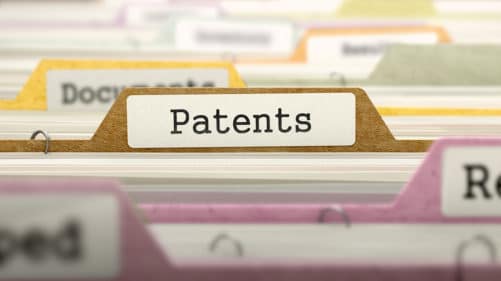GoDaddy adds to patent arsenal with another domain search patent.

The U.S. Patent and Trademark Office granted patent number 9,787,634 to GoDaddy today for Suggesting domain names based on recognized user patterns.
The patent describes ways to make domain name suggestions better. According to the patent:
Many current-available solutions to finding the ideal available domain name rely on static language dictionaries including information such as part-of-speech and synonyms. Issues associated with this static approach include, for example, a limited number of synonyms, static vocabulary dictionaries which do not rank the popularity of synonyms when considering name ranking, and no consideration of domain name transformation types.
The current invention addresses these types of issues by providing domain name generation, filtering of low-quality domain names, and domain name ranking. This invention identifies interchangeable terms together with their popularity based on frequency of use as analyzed from data within domain names search logs and domain name zone files 320. Language models for name filtering and machine-learned ranking further refines the quality of domain name search suggestions while avoiding false positives or spurious suggestions.
The user’s search history can be considered to generate the best available domains:
As a non-limiting example of a user log entry 315 stored in data storage 230, a user may access a registrar web page to determine domain name availability. The user may search the domain name loanstar.com, which the domain name search software may determine is not available. The user may then search “loan-star.com,” adding a dash to the original query. If this domain name is not available, the user may attempt the domain name “theloan.com,” dropping the word star and pre pending the article “the.” If this is not available, the user may attempt additional words, numbers or stemming (dropping “the,” and appending “guru,” or “247” resulting in “loanguru.com” or “loan247.com,” or creating a stem to “loaner.com” respectively), or may replace existing words (e.g., “loanninja.com” as opposed to “loanguru.com”).
After data records for a search session 315 are created, dictionary aggregation software 330 may reconstruct each original search session 315, as well as the order of each action taken by the user within the session(s), and may create an ontology for terms used in the search, thereby generating dictionary 325 data and providing learning data for machine learning.
The patent lists Wei-cheng Lai, Yang Zhao, Moninder Jheeta, and Tapan Kamdar as inventors. You can view the full patent here (pdf).






I was on Godaddy last night checking a few things and the domain they recommended automatically for me wasn’t anything I would ever buy. I wouldn’t have even accepted it for free. That’s how bad the suggestion was. They may need some fine tuning to get it working better.
“This invention” is a joke.
“… and providing learning data for machine learning”
EFF says we are likely to see a large number of patents that read like the table of contents of an intro to AI textbook and will ultimately slow down AI development.
https://www.eff.org/deeplinks/2017/09/stupid-patent-month-will-patents-slow-artificial-intelligence
Not too long ago, when I was young and stupid, I registered some domains (in languages other than English) that are considered controversial and unprofessional. Few of these extreme domains were recognized as such by Afternic, nor were they barred.
My fear with GoDaddy’s new name suggestion system is that I could be sitting with a client, family member or friend, helping them to register a domain name, and GoDaddy would suggest a name combination that would cause that person to reconsider whether they should be associating with me. At a minimum, seeing an extreme word or phrase appearing in my search results would create a poor shopping experience.
Business is based on trust. People who work with me need to trust me. In turn, I need to trust my vendors. GoDaddy’s patent for name suggestions places that trust in doubt.